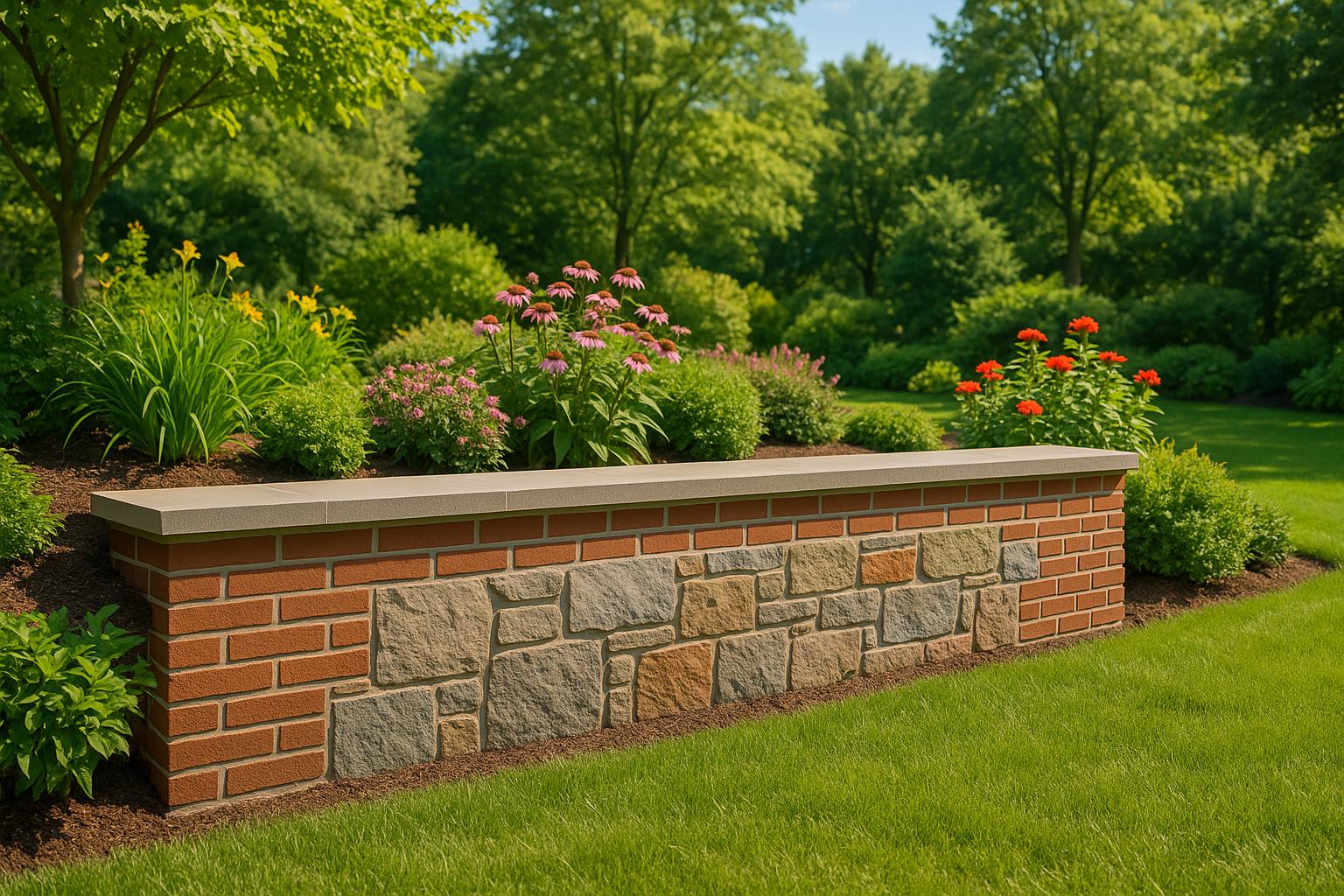- bhavya gada
- No Comments
When building garden walls in Maryland, choosing the right material is key to handling the state’s wet springs, humid summers, and freezing winters. Here’s a quick breakdown of the best options:
- Natural Stone: Long-lasting and visually appealing, but more expensive ($25–$75 per sq. ft.). Minimal maintenance required.
- Brick: Durable and classic, with costs ranging from $10–$45 per sq. ft. Handles Maryland’s freeze-thaw cycles well.
- Concrete Blocks: Affordable ($15–$35 per sq. ft.), versatile, and durable, but prone to freeze-thaw damage without proper drainage.
- Manufactured Stone Veneer: A cost-effective alternative to natural stone ($10–$35 per sq. ft.), though less durable and requires proper waterproofing.
- Timber: Budget-friendly ($10–$40 per sq. ft.) with a rustic look but high maintenance and shorter lifespan in Maryland’s climate.
Quick Comparison:
| Material | Lifespan | Cost per Sq. Ft. | Maintenance | Climate Performance |
|---|---|---|---|---|
| Natural Stone | 50+ years | $25–$75 | Low | Excellent |
| Brick | 50+ years | $10–$45 | Low | Good |
| Concrete Blocks | 50+ years | $15–$35 | Low | Very Good |
| Manufactured Stone Veneer | 10–25 years | $10–$35 | Moderate | Fair |
| Timber | 15–30 years | $10–$40 | High | Poor |
For Maryland’s weather, durable materials like natural stone, brick, or concrete blocks are the best long-term options. Proper installation and drainage systems are crucial for all materials to ensure performance and longevity.
1. Natural Stone
Aesthetic Appeal
Natural stone can transform garden walls into stunning centerpieces that elevate both property value and curb appeal. Features like stone veneer and decorative stonework bring a sense of charm and elegance to any outdoor space[4]. Plus, the natural variations in color, texture, and pattern ensure that every installation has its own distinct personality.
Cost Range
Investing in natural stone comes with a price tag, as these walls typically range from $25 to $75 per square foot[5]. If you’re looking for a more affordable option, dry-stack stone walls cost slightly less, falling between $20 and $60 per square foot[5]. The final cost depends on several factors, including the type of stone, wall dimensions, design complexity, site conditions, and additional needs like foundation work, excavation, or drainage systems[5].
If you’re considering incorporating natural stone into your garden wall, Pro Landscapes MD can provide expert advice and help you create a design that’s both beautiful and long-lasting.
2. Brick
Aesthetic Appeal
Brick offers a timeless charm that adds a classic touch to garden walls. With its rich textures and natural color variations, it creates a warm and welcoming look that can complement nearly any home style. Whether you’re enhancing a historic Colonial or a sleek, modern home, brick’s adaptability allows it to fit seamlessly into various architectural and garden designs [6][9].
What makes brick even more appealing is the range of customization options it provides. You can experiment with bond patterns like herringbone or basket weave, or add decorative details such as arches and columns to reflect your personal style [7][9]. For instance, Argent Realty in Silver Spring, MD, highlights how thoughtful landscaping can elevate a home’s aesthetic. They suggest pairing a historic Colonial with symmetrical plantings, neatly trimmed boxwoods, and a curved walkway, while modern homes might benefit from clean lines and minimalist hardscaping [8].
Cost Range
When it comes to cost, brick is a flexible option. Material prices range from $10–$45 per square foot, with labor costs averaging $60–$105 per hour [10]. For standard clay brick walls, expect to pay $20–$30 per square foot, while smaller walls could cost $15–$20 per square foot or $15–$40 per linear foot. A full 10–25-foot installation typically runs between $150–$1,000, with Maryland projects aligning with the national average of $5,000–$9,000, depending on the wall size, brick type, and local labor rates [5][10].
Brick’s affordability, paired with its aesthetic versatility, makes it a practical choice for many homeowners.
Suitability for Maryland’s Climate
Maryland’s weather can be unpredictable, with humid summers and chilly winters, so choosing a material that can handle these fluctuations is crucial. Brick rises to the challenge, offering durability and resilience in the face of changing conditions. Its solid construction resists damage from temperature swings, and when combined with proper drainage, it stands up well to the region’s climate demands [2]. This makes brick a dependable, long-lasting option for outdoor walls in Maryland.
3. Concrete Block (Segmental Retaining Wall Blocks)
Durability
When made with quality materials, concrete blocks can endure for over a century. However, exposure to harsh conditions or the use of lower-quality materials can reduce their lifespan to about 50 years [14].
Maryland’s climate poses unique challenges for concrete blocks, particularly due to moisture and deicing salts. These elements are major contributors to freeze-thaw damage, which can significantly impact the durability of retaining walls [11]. A study conducted by the Maryland Department of Transportation in July 2001 reviewed 104 segmental retaining walls constructed before 1994. The study found that while only 7 percent of the walls were rated as poor or very poor, more than 50 percent showed signs of freeze-thaw damage [12].
"Walls located at parking lots or close to the roadway exhibited the most damage, due to increased amounts of snow accumulation and water runoff, therefore allowing for greater saturation, and exposure to deicing salts" [12].
To enhance durability, it’s wise to choose high-quality concrete blocks designed to withstand freeze-thaw cycles. Applying silane or siloxane coatings can help prevent moisture penetration, and incorporating proper drainage systems can further reduce damage caused by freezing and thawing [11].
Aesthetic Appeal
Segmental retaining wall blocks offer a wide range of design options while maintaining a clean and structured appearance. They come in various textures, colors, and sizes, making it easy to match them to any landscaping style. Their modular design allows for flexibility in construction, making it simple to create curves, corners, and walls of varying heights [13].
Unlike natural stone, concrete blocks provide consistent dimensions and uniformity, appealing to homeowners who prefer a modern, polished look. Many manufacturers even produce blocks that mimic the texture of natural stone, offering the best of both worlds: the aesthetic of stone with the precision and ease of concrete installation.
And the best part? These design perks come at a price point that won’t break the bank.
Cost Range
Concrete block walls are a cost-effective solution for Maryland homeowners. Installation costs typically fall between $15 and $30 per square foot for standard uses. Retaining wall applications range from $20 to $35 per square foot, while block fences cost $15 to $30 per square foot [15].
In Bethesda, Maryland, the cost of retaining walls can range from $16 to $50 per square foot, depending on the material used. Concrete blocks are generally on the more affordable end of this spectrum [16]. Factors like foundation requirements, reinforcement needs, and whether the wall is load-bearing can influence the final price [15].
Suitability for Maryland’s Climate
Concrete blocks are particularly well-suited to Maryland’s demanding climate. They hold up against extreme weather conditions and require minimal maintenance once installed properly [17]. From the hot summers to the icy winters and varying humidity levels, concrete blocks resist cracking, erosion, and other weather-related damage better than many alternative materials [19].
Given Maryland’s hilly terrain, retaining walls made from concrete blocks are especially useful for preventing soil erosion and managing water runoff in lawns and gardens [17]. Concrete’s strength also makes it easier to integrate effective drainage systems, which are essential for handling Maryland’s frequent rain and preventing water buildup that could weaken the wall over time [19].
Experts, such as Baltimore-based Detailz Construction, stress the importance of proper installation to ensure long-lasting performance. They highlight critical factors like "the grade of earth, the quantity of crushed stone needed to prevent hydrostatic pressure, footing sizes, and other considerations" [18]. Details such as weep holes, drainage systems, geogrid reinforcement, and properly compacted soil and stone behind the wall are essential for ensuring durability and preventing future issues [18].
4. Manufactured Stone Veneer
Durability
Manufactured stone veneer is built to handle Maryland’s tough weather conditions. It’s designed to endure extreme temperatures, heavy rain, and snow, while also resisting rot and insect damage. However, achieving this level of durability depends on proper installation. This includes thorough preparation of the substrate, correct flashing, and comprehensive waterproofing measures [20]. When installed correctly, products like Affinity Stone veneer panels can last over 50 years [21]. Brands such as Casa di Sassi even offer 50-year warranties against issues like blistering, peeling, flaking, delaminating, and cracking, provided installation guidelines are followed [20]. To manage moisture effectively, adding a drainage mat or furring strips to create an air gap between the veneer and the wall is crucial [22]. The result? A material that combines long-lasting performance with natural charm.
Aesthetic Appeal
Manufactured stone veneer captures the beauty of natural stone while offering consistent design quality. It can replicate virtually any natural stone style, from rugged fieldstone to refined limestone. Companies like Pro Landscapes MD use premium options such as El Dorado Stone [4] to craft decorative features that elevate the look of Maryland properties. Its uniform dimensions and polished appearance make it an excellent choice for those seeking a modern aesthetic with the timeless allure of stone. Plus, it integrates seamlessly into various architectural styles and landscape designs.
Cost Range
For those looking for a more affordable alternative to natural stone, manufactured stone veneer is a practical option. Material costs range between $4 and $20 per square foot, with installation adding another $6 to $24 per square foot [25]. This brings the total installed cost to roughly $10 to $35 per square foot [25]. For example, Casa di Sassi stone veneer is priced between $8 and $12.50 per square foot [23]. In contrast, natural stone can cost $35 to $50 per square foot for materials alone, with installation adding an extra $20 to $30 per square foot [23].
Suitability for Maryland’s Climate
Maryland’s unpredictable weather demands materials that can handle a variety of conditions, and manufactured stone veneer fits the bill. Its composition – cement, lightweight aggregates, and iron-oxide pigments [24] – makes it highly resistant to freeze-thaw cycles. Proper waterproofing further ensures that water won’t seep in, preventing issues like mold, mildew, and damage caused by freezing and expansion [20]. For optimal performance, installations should include a two-layer water-resistant barrier and proper flashing systems [20]. Thanks to its engineered resilience and moisture resistance, manufactured stone veneer is well-equipped to withstand Maryland’s humid summers, rainy springs, and occasional severe storms.
sbb-itb-843f8be
BACKYARD RETAINING WALL DESIGN IDEAS | 10 BEST GARDEN RETAINING WALL MATERIALS FOR OUTDOOR SPACE
5. Timber
When choosing timber for garden walls in Maryland, it’s essential to weigh its affordability and natural charm against the maintenance it requires in the state’s ever-changing climate.
Durability
Timber’s durability can be a challenge in Maryland’s environment. The constant cycles of expansion, contraction, and exposure to moisture often lead to issues like cracks, mold, and decay. If wood stays wet with a surface moisture content above 20% for long periods, it becomes highly susceptible to mold growth [29].
To improve its longevity, it’s crucial to select pressure-treated or thermally modified wood and avoid any direct contact with soil. Without these precautions, timber is vulnerable to decay from repeated moisture exposure, temperature fluctuations, and freeze-thaw cycles.
Modern pressure-treated wood has come a long way. Jeanne Huber from The Washington Post highlights these advancements:
"It’s true that arsenic is no longer used as a preservative for wood sold for projects around the house, although it still can be used for some commercial projects. However, the replacement chemicals should ensure that wood lasts for decades, even when in contact with damp soil, which is where the fungi that cause wood to rot and insects such as termites and carpenter ants do the most damage." [26]
For better durability, consider thermally modified wood, which is heated to release moisture, improving its stability [28]. Proper installation is also key: structures should be at least 12 inches off the ground, with adequate spacing for water runoff. Creating an air gap of at least 1 inch behind boards helps prevent moisture damage [28].
Aesthetic Appeal
Despite its durability concerns, timber’s natural beauty makes it a standout choice for certain settings. Timber walls bring a warm, woodsy charm that fits perfectly in smaller or rustic landscapes [1]. They blend effortlessly into wooded areas and add unique character, enhancing Maryland’s natural surroundings. The organic look of wood creates an inviting atmosphere, complementing both classic and modern landscape designs.
Timber also offers versatility when it comes to design. Whether you prefer rustic split-rail styles or sleek, refined planks, wood allows for a wide range of aesthetic options. It’s also a renewable material, appealing to those who value environmentally-conscious choices [3].
Cost Range
Timber is one of the more budget-friendly materials for garden walls. Prices typically range from $10 to $40 per square foot, with pressure-treated options falling between $12 and $25 per square foot [1]. In Bethesda, Maryland, retaining wall costs vary from $16 to $50 per square foot depending on the material used, including timber [16].
While the initial cost is appealing, timber’s shorter lifespan compared to concrete or stone – both of which can last 40 years or more – may lead to higher replacement costs over time [30]. This makes it important to weigh the lower upfront investment against the potential for future maintenance and replacement expenses.
Suitability for Maryland’s Climate
Maryland’s climate, with its fluctuating weather and active insect presence, presents unique challenges for timber garden walls. Termites and carpenter ants are particularly problematic in this region [28]. However, with proper care and installation, timber can still perform well.
Key strategies for maintaining timber in Maryland include ensuring proper airflow behind boards, using corrosion-resistant fasteners like stainless steel, and maintaining good ventilation and drainage [28]. For added protection, lining timber structures with plastic can prevent direct soil contact [27]. Regular cleaning to remove dirt and organic buildup is another effective way to extend the lifespan of timber installations [28].
Though timber requires more upkeep than stone or concrete alternatives, it remains a practical and attractive option for Maryland homeowners seeking an affordable, natural-looking solution for their garden walls. By combining thoughtful installation techniques with regular maintenance, timber can thrive even in Maryland’s demanding climate.
Material Comparison Chart
Choosing the right material for your Maryland garden wall involves balancing durability, cost, maintenance, and how well it performs in the local climate. Here’s a quick look at how different materials stack up:
| Material | Durability/Lifespan | Cost per Sq Ft | Maintenance Needs | Appearance | Climate Performance |
|---|---|---|---|---|---|
| Natural Stone | 50+ years (often indefinite) [32] | $25–40 [33] | Minimal upkeep | Timeless, elegant | Excellent – naturally weather-resistant |
| Brick | 50+ years | $20–35 | Low maintenance | Classic, traditional | Good – handles freeze-thaw cycles well |
| Concrete Block | 50+ years [31] | $15–25 [33] | Minimal | Versatile, modern | Very good – strong structural performance |
| Manufactured Stone Veneer | 10–25 years [32] | $18–30 | Frequent repairs needed | Attractive but may fade | Fair – prone to moisture damage |
| Timber | 15–30 years [31] | $10–15 [33] | High – regular sealing required | Rustic, natural | Poor – vulnerable to Maryland’s humidity |
The table highlights the strengths and weaknesses of each material, but let’s break it down further to understand their long-term performance.
Natural stone is an investment upfront, but its longevity and minimal maintenance make it a top-tier choice. Its natural resistance to weathering ensures it holds up beautifully over decades, even in Maryland’s challenging climate.
Concrete blocks strike a balance between cost and durability. With proper design and drainage, a concrete masonry unit (CMU) wall can last over 50 years [31]. This makes it a practical option for areas with freeze-thaw cycles, like Maryland.
Brick offers a classic look and long lifespan with relatively low maintenance. Its ability to handle freezing and thawing makes it a reliable choice for the region.
On the other hand, timber might seem appealing due to its lower upfront cost, but it requires frequent sealing and has a shorter lifespan of 15–30 years. In Maryland’s humid conditions, timber walls often need replacement sooner, making them less cost-effective over time [31].
Manufactured stone veneer provides an attractive appearance at a moderate price, but its shorter lifespan (10–25 years) and susceptibility to moisture damage can lead to higher long-term costs.
When deciding, it’s important to think beyond the initial price tag. Materials that require less maintenance and last longer often save money over 20–30 years. Maryland’s climate, with its humidity and freeze-thaw cycles, favors durable, weather-resistant options like natural stone, brick, or concrete blocks. While cheaper materials may seem economical at first, frequent repairs or replacements can quickly add up.
Conclusion
Building a garden wall in Maryland means choosing materials that can handle the state’s wet springs and freezing winters. The comparison chart above highlights how different materials stand up to these conditions.
Here’s a quick rundown: natural stone stands out for its durability and minimal maintenance, while concrete blocks and brick offer a solid mix of strength and affordability. On the other hand, manufactured stone veneer and timber bring aesthetic appeal but require more ongoing care. Maryland’s climate demands materials that provide good drainage and can endure the elements.
Don’t forget to factor in local soil conditions and ensure your project complies with building codes – these steps can save you trouble down the road.
If you’re ready to move forward, Pro Landscapes MD specializes in hardscaping services throughout central Maryland. Whether it’s garden walls, retaining walls, or stone veneers, their team combines design expertise with practical know-how to create structures that look great and stand up to Maryland’s unique climate.
A well-built garden wall not only enhances your property’s curb appeal but also adds lasting value. By selecting materials that fit your budget, style, and maintenance preferences, you’ll create a feature that thrives in Maryland’s challenging environment.
FAQs
What materials work best for building garden walls in Maryland’s climate?
When picking materials for garden walls in Maryland, you’ll want to focus on strength, weather resistance, and aesthetic appeal. With Maryland’s fluctuating temperatures and freeze-thaw cycles, materials like natural stone and concrete blocks stand out for their durability and ability to handle the elements. If sustainability is a priority, reclaimed wood or recycled concrete can be excellent choices, offering both practicality and an eco-conscious vibe to your garden.
It’s also important to think about how the material fits with your overall landscape design and how much upkeep it will require. The right choice will ensure your garden wall stays sturdy and visually pleasing for years to come.
What are the cost and maintenance differences between natural stone and brick for garden walls?
Natural stone comes with a higher upfront cost, typically ranging from $20 to $85 per square foot, but it’s built to last – over 100 years with very little upkeep. Brick, meanwhile, is a more budget-friendly option initially, with prices between $14.65 and $30 per square foot. It’s also durable, though it might need occasional touch-ups like repointing or sealing over time.
Both materials perform well in Maryland’s climate. Natural stone stands out in the long run due to its longevity and low maintenance, making it a smart investment. Ultimately, your choice between the two will depend on your budget and aesthetic goals, as both offer durability and visual appeal.
How can I protect garden walls in Maryland from water damage and freezing during winter?
To keep garden walls in Maryland safe from water damage and freezing, proper drainage is a must. Consider installing systems like French drains, catch basins, or adjusting the grading to direct water away from the wall. Regularly check and clear drainage paths to avoid water buildup, which can freeze, expand, and harm the structure.
In winter, reduce the risk of freeze-thaw damage by insulating areas that are most exposed and keeping an eye on the wall for signs of ice or water issues. These precautions are especially important in Maryland’s unpredictable winter weather, helping to preserve the strength and lifespan of your garden walls.


















Chat with Us